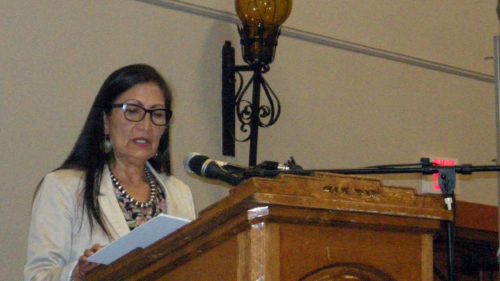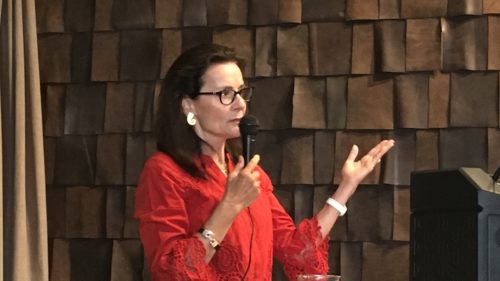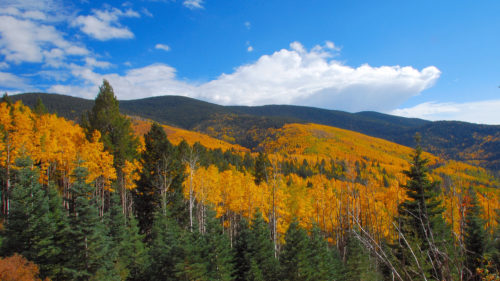TAOS — A state judge on Thursday gave a private landowner 60 days to remove gates and any other obstructions on roads leading to popular hunting areas on state trust lands near White Peak.
Judge Sarah C. Backus granted a request from the New Mexico Attorney General’s Office to order landowner David Stanley to remove the barriers on five roads crossing his ranch in northeastern New Mexico.
Backus had ruled last year that portions of 11 roads that cross Stanley’s property remained public. The judge pointed to a 19th century federal law that holds routes that were public when the federal government owned a property remain public after it passes into private hands.
Stanley is appealing Backus’ ruling that the roads are public. However, Backus at Thursday’s hearing in Taos declined a request from Stanley’s lawyer to put her ruling on hold while the appeal is pending.
The AG’s Office filed papers with Backus in December stating that despite the judge’s ruling last year that the 11 roads were public, hunters had been unable to use five of the roads on Stanley’s property because of locked gates and other obstructions.
The AG’s Office asked the judge in December to order Stanley to remove the obstructions and also to pay for the cost of the legal action and the cost of having officers with the New Mexico Department of Game and Fish document that the roads were closed.
“Mr. Stanley was caught red-handed,” Assistant Attorney General Ari Biernoff told Backus on Thursday. Biernoff said the state’s investigation documented repeated instances where the roads were closed last year. The state filed statements in court from hunters who were unable to use the roads.
Donald A. Walcott, lawyer for Stanley, told Backus on Thursday that state lawyers should have informed Stanley of any concerns about the roads being blocked last year before going back to court.
“We were in communication with counsel and they never said one thing to us,” Walcott said. He said Stanley opened closed gates as soon as he was informed about them and said they weren’t aware of any hunters being prevented from accessing state lands.
Walcott argued that it would be in the public’s interest for Backus to delay enforcing her ruling that the roads are public while Stanley appeals that decision.
“There’s not going to be harm to the state,” Walcott said. “The state really hasn’t pursued public roads in this area for decades and decades prior to the filing of this case.”
Walcott said it would be a bad idea to open up all the properties to public access while the case is on appeal. For example, he said Stanley could be sued if a motorist had an accident while driving across his property.
Jesus Lopez, a Las Vegas lawyer serving as special assistant attorney general on the Stanley litigation, argued against Stanley’s request that Backus place her ruling on hold during the appeal.
Lopez said Stanley hadn’t met the legal requirement of showing that he would suffer irreparable harm if Backus declined to place her ruling on hold. Lopez also said Stanley didn’t meet the legal requirement of showing that doing so would be in the public interest.
“Clearly there would be substantial harm to everyone who uses those roads,” Lopez said of Stanley’s request.
Backus refused Stanley’s request to delay her order while the appeal is pending. She also refused the state’s request to impose sanctions against Stanley for the cost of the investigation into the road status.
Backus ordered Stanley to remove any locked gates or other barriers in the roadways. “I understand there could be an issue of the ability to do that in the wintertime, but that will have to be done within 60 days,” she said.
Speaking after the hearing, Stanley said he would be able to remove the barriers from the roads as Backus ordered.
“I think all the parties should get together to try to find a solution to all the issues that will continue even past all the legal cases,” Stanley said. He said he’s concerned about significant degradation of game management and about the effects on the land.
Biernoff said after the ruling that he believes Backus’s ruling shows she recognized that public access to the White Peak area can’t wait.
“Public access needs to happen, can’t be impaired, right now,” Biernoff said. “So it’s a huge win, another important victory for the state of New Mexico and the people of New Mexico.”
Stanley had kicked off the litigation in 2011 by filing suit against Mora County seeking a judicial declaration that the roads on his ranch were private. Frank Maestas, chairman of the Mora County Commission, attended Thursday’s hearing.
Speaking after the hearing, Maestas said his grandfather, born in 1895, had hunted in the White Peak area. Maestas said generations of his family have hunted there ever since and said he has taken his own grandson hunting there.
“Many, many fathers have taught their sons to hunt up there because of the uniqueness of the area,” Maestas said. “My father and I hunted up there when I was a kid.”
Keeping the area open is vitally important to area residents and the preservation of their family traditions, Maestas said. “To deny access to something that we have a right to do is just beyond our comprehension as a community,” he said. “I have had several constituents approach me just yesterday to ask me if we would continue to see this through for the sake of the community. It’s just a culture that we know.”



